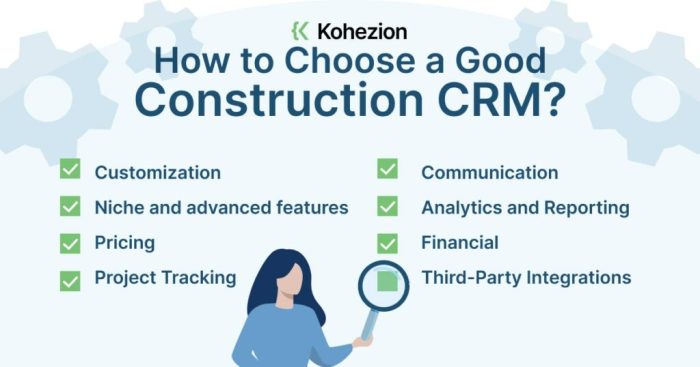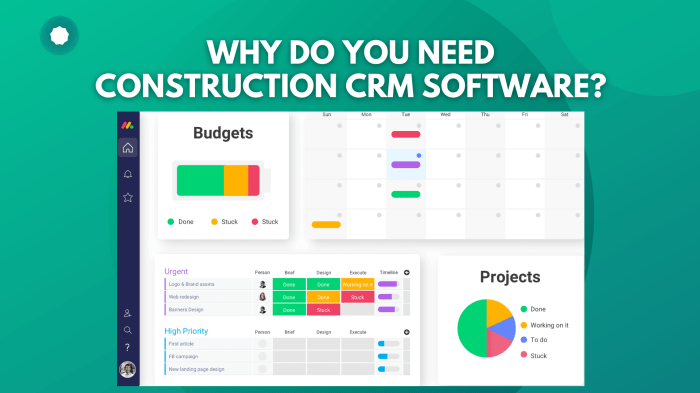The construction industry is demanding, requiring meticulous project management, seamless communication, and efficient resource allocation. A robust Construction CRM (Customer Relationship Management) system can be the key to streamlining operations and boosting profitability. This comprehensive guide explores the best construction CRM software options available, helping you choose the perfect solution for your business needs. We’ll delve into key features, pricing models, and integration capabilities, ensuring you make an informed decision.
Understanding the Need for Construction CRM Software
Traditional methods of managing construction projects often involve scattered spreadsheets, email chains, and countless phone calls. This fragmented approach can lead to miscommunication, missed deadlines, and ultimately, project delays and cost overruns. A dedicated construction CRM software centralizes all project-related information, improving collaboration, enhancing visibility, and optimizing workflows. Key benefits include:
- Improved Client Communication: Centralized communication platform ensures everyone is on the same page.
- Enhanced Project Management: Streamlined task management, deadline tracking, and progress monitoring.
- Better Lead Management: Efficiently track leads, nurture relationships, and convert them into paying clients.
- Increased Productivity: Automation of repetitive tasks frees up time for strategic initiatives.
- Improved Reporting and Analytics: Gain valuable insights into project performance and business trends.
- Reduced Administrative Overhead: Automation and centralized data reduce paperwork and manual processes.
Key Features to Look for in Construction CRM Software
When selecting a construction CRM, consider these essential features:
Project Management Capabilities, Best construction crm software
- Task Management: Assign, track, and manage tasks efficiently with customizable workflows.
- Timeline & Gantt Charts: Visualize project schedules and identify potential bottlenecks.
- Document Management: Securely store and share project-related documents (blueprints, contracts, etc.).
- Progress Tracking: Monitor project progress against milestones and deadlines.
- Resource Allocation: Optimize the allocation of personnel, equipment, and materials.
Client Relationship Management (CRM) Features
- Contact Management: Centralized database for storing client information and communication history.
- Lead Management: Track leads from initial contact to project completion.
- Communication Tools: Integrated email, messaging, and call logging features.
- Customer Portals: Provide clients with access to project updates and documents.
Reporting and Analytics
- Customizable Reports: Generate reports on project performance, financial data, and client interactions.
- Data Visualization: Use charts and graphs to analyze key performance indicators (KPIs).
- Real-time Dashboards: Monitor project progress and identify potential issues quickly.
Integrations
- Accounting Software: Seamless integration with accounting software for accurate financial tracking.
- Project Management Tools: Integration with other project management platforms for enhanced workflow.
- Email Marketing Platforms: Integrate with email marketing tools for efficient client communication.
Top Construction CRM Software Options
The market offers a variety of construction CRM software solutions. Choosing the right one depends on your specific needs and budget. Here are a few popular options:
1. [Software Name 1]
[Detailed description of software 1, including features, pricing, pros, and cons. Mention specific integrations, user experience, and target audience. Include a link to their website.]
2. [Software Name 2]
[Detailed description of software 2, including features, pricing, pros, and cons. Mention specific integrations, user experience, and target audience. Include a link to their website.]
3. [Software Name 3]
[Detailed description of software 3, including features, pricing, pros, and cons. Mention specific integrations, user experience, and target audience. Include a link to their website.]
4. [Software Name 4]
[Detailed description of software 4, including features, pricing, pros, and cons. Mention specific integrations, user experience, and target audience. Include a link to their website.]
Choosing the Right Construction CRM Software
Selecting the optimal CRM involves careful consideration of several factors:
- Business Size and Needs: Small businesses may require simpler solutions, while larger enterprises need more comprehensive systems.
- Budget: CRM software pricing varies widely, from subscription-based models to one-time purchases.
- Integration Capabilities: Ensure the CRM integrates seamlessly with your existing software.
- User-Friendliness: Choose a system that is intuitive and easy for your team to use.
- Scalability: Select a solution that can grow with your business.
- Customer Support: Reliable customer support is crucial for resolving issues and getting assistance.
Frequently Asked Questions (FAQ)
- Q: What is the average cost of construction CRM software? A: Pricing varies greatly depending on features and the number of users. Expect to pay anywhere from a few hundred dollars per month to several thousand.
- Q: Can I integrate my existing accounting software with a construction CRM? A: Many construction CRMs offer integrations with popular accounting software like QuickBooks and Xero.
- Q: How long does it take to implement a construction CRM? A: Implementation time depends on the complexity of the system and the size of your business. It can range from a few weeks to several months.
- Q: What are the key benefits of using a construction CRM? A: Improved communication, enhanced project management, better lead management, increased productivity, and reduced administrative overhead.
- Q: Is cloud-based CRM better than on-premise? A: Cloud-based CRMs offer greater accessibility, scalability, and cost-effectiveness, while on-premise solutions provide more control over data security.
Conclusion
Implementing the right construction CRM software can significantly improve your business operations, leading to increased efficiency, profitability, and client satisfaction. By carefully considering your specific needs and evaluating the features of different platforms, you can find the perfect solution to streamline your workflows and propel your construction business to new heights. Remember to thoroughly research and compare options before making a decision.
Call to Action: Best Construction Crm Software
Ready to transform your construction business? Explore the options discussed above and choose the CRM that best suits your needs. Start your free trial today and experience the benefits of a streamlined workflow!
Q&A
What are the key features to look for in construction CRM software?
Key features include project management tools, contact management, lead tracking, reporting and analytics, document management, and mobile accessibility.

Source: kohezion.com
How much does construction CRM software typically cost?
Pricing varies greatly depending on features, scalability, and vendor. Expect a range from affordable monthly subscriptions to more substantial upfront investments for enterprise-level solutions.
Can construction CRM software integrate with other business tools?
Many CRM systems offer integrations with accounting software, project management platforms, and other business applications, enhancing overall efficiency.

Source: cjpath.com
What is the typical implementation timeframe for construction CRM software?
Implementation time depends on the complexity of the system and the size of your business. It can range from a few weeks to several months.
How can I choose the best CRM software for my specific construction business needs?
Start by identifying your key requirements, comparing features and pricing across different vendors, and potentially trying out free trials or demos before committing to a purchase.
